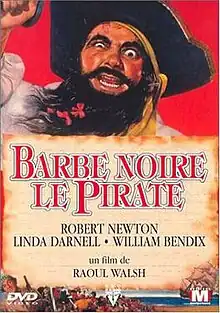Blackbeard the Pirate
Blackbeard the Pirate is a 1952 Technicolor adventure film directed by Raoul Walsh and starring Robert Newton, Linda Darnell, William Bendix, Keith Andes, and Torin Thatcher. The film was made by RKO Radio Pictures and produced by Edmund Grainger from a screenplay by Alan Le May based on the story by DeVallon Scott.
| Blackbeard the Pirate | |
|---|---|
 DVD cover for French film version | |
| Directed by | Raoul Walsh |
| Written by | DeVallon Scott |
| Screenplay by | Alan Le May |
| Produced by | Edmund Grainger |
| Starring | Robert Newton Linda Darnell William Bendix Keith Andes Torin Thatcher |
| Cinematography | William E. Snyder |
| Edited by | Ralph Dawson |
| Music by | Victor Young |
Production company | |
| Distributed by | RKO Pictures |
Release dates | |
Running time | 99 minutes |
| Country | United States |
| Language | English |
| Box office | $1.25 million (US)[2] |
Plot
_1.jpg.webp)
The film follows British Navy Lieutenant Robert Maynard (Keith Andes), who sets out to earn a reward by proving that privateer Henry Morgan (Torin Thatcher) also engages in piracy.
Maynard poses as a surgeon on board the ship of pirate Charles Bellamy, who he believes is in league with Morgan. Once Maynard and fellow spy Briggs come on board, they discover that the pirate Blackbeard (Robert Newton) has murdered Bellamy and taken over as captain.
Also on board is Edwina Mansfield, a pirate's daughter, who was going to marry Bellamy. Blackbeard knows that Morgan loves Mansfield and will pursue her.
Blackbeard orders Maynard to remove a bullet from his neck, and demands sailor Gilly watch him. Gilly slips Maynard a note begging him to slit the pirate's throat, but Maynard declines.
Maynard slips into the Blackbeard's quarters and finds Bellamy's logbook, which he hopes will contain evidence that Bellamy gave Morgan stolen goods.
Maynard then defends Edwina against the unwanted advances of a lecherous pirate, killing him with his dagger. She tells Maynard that she agreed to marry Bellamy to escape from Morgan, from whom she has stolen treasure, which is now hidden in a clothes chest.
Blackbeard breaks open one of Edwina's chests but discovers only letters in which Edwina implicates Morgan as Bellamy's ally. Maynard tries to steal the letter, but Blackbeard stops him, noting that if Morgan were arrested, all of his loot would go to the King.
Blackbeard finally identifies the treasure chest and claims it.
Cast
- Robert Newton as Captain Edward Teach
- Linda Darnell as Edwina Mansfield
- William Bendix as Ben Worley
- Keith Andes as Robert Maynard
- Torin Thatcher as Sir Henry Morgan
- Irene Ryan as Alvina, a lady in waiting
- Alan Mowbray as Noll
- Richard Egan as Briggs
- Skelton Knaggs as Gilly
- Dick Wessel as Dutchman
- Anthony Caruso as Pierre La Garde
- Jack Lambert as Tom Whetstone
- Noel Drayton as Jeremy
- Pat Flaherty as Job Maggot
Production
The film was based on an original story by DeVallon Scott. It was on the schedule at RKO for 16 months before being taken over by producer Edmund Grainger for his independent unit. It originally conceived as a vehicle for Faith Domergue. It was going to be filmed under the title Buccaneer Empire by director Robert Stevenson.[3][4][5] Several months later RKO announced the lead would be played by Robert Newton, who had just enjoyed success playing Long John Silver in Treasure Island (1950).[6] Production took a while to begin; for a time it seemed Newton might be replaced by Charles Laughton.[7] Alan Le May was hired to rewrite the script shortly before filming began on 15 May 1952.[8]
References
- "Blackbeard the Pirate: Detail View". American Film Institute. Retrieved 31 May 2014.
- 'The Top Box Office Hits of 1953', Variety, 13 January 1954
- Brady, Thomas F. "Ballerina will do role for Goldwyn". The New York Times, 14 November 1950, p. 38
- Brady, Thomas F. (29 December 1950). "R. K. O. TO DO FILM OF OLD CRIME PLAY: Studio Will Remake 'Racket,' Bartlett Cormack's '27 Hit, With Robert Ryan in Cast". p. 15.
- Weiler, A.H. (24 December 1950). "BY WAY OF REPORT: Kaye and Disney Consider A Proposal--Addenda". The New York Times. p. 43.
- .Schallert, Edwin (27 February 1951). "Drama: Robert Newton to Play Blackbeard; 'Bickersons' Video Show Likely Film". Los Angeles Times. p. 17.
- Pryor, Thomas M (1 January 1952). "MOVIE ON FIGHTING TO BEGIN ON COAST: Jack Broder Will Screen 'Kid Monk Baroni' -- Its Author to Share in Picture's Profits". The New York Times. p. 21.
- Pryor, Thomas (10 April 1952). "SCREEN EXTRAS WIN GENERAL WAGE RISE: Increase Retroactive to Oct. 25 -- Contract, Based on Cost of Living, Runs Until 1958". The New York Times. p. 37.